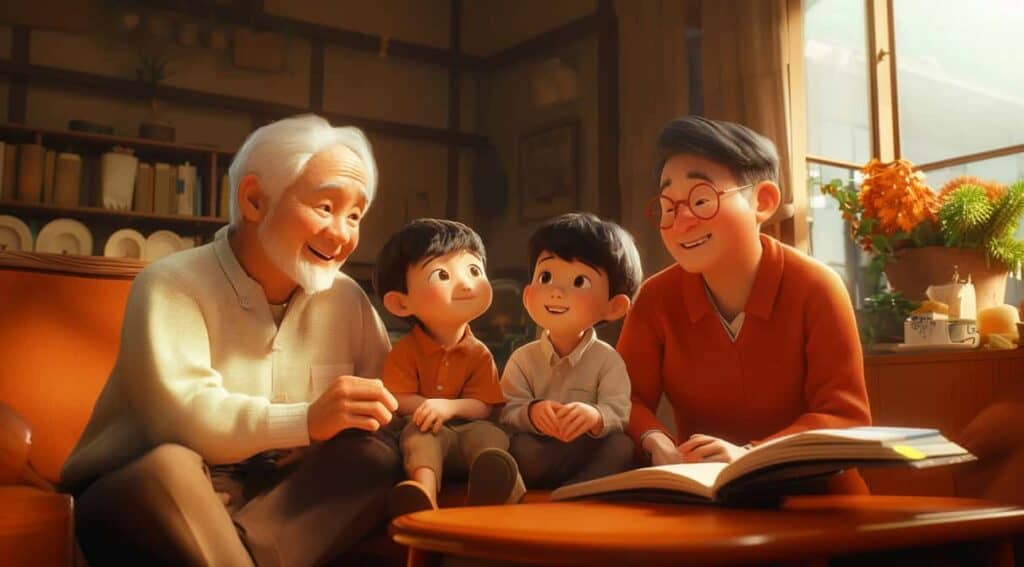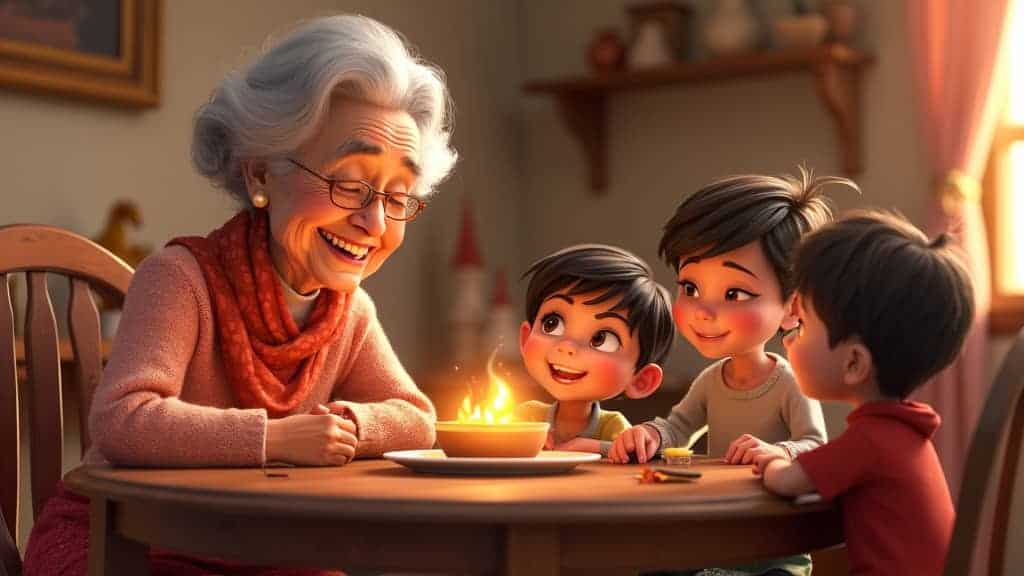THE grandparent/parent relationships are at the heart of the family dynamics modern, weaving a network oflove, of traditions and sometimes of Conflicts. These intergenerational links shape the environment of grandchildren, influencing their development. Each generation brings his perspective on theeducation and the values, making thebalance sometimes delicate.
The key lies in a communication open and a respect mutual of roles. THE grandparent-parent interactions oscillate between ancestral wisdom and contemporary methods, requiring flexibility And understanding. Establish boundaries healthy while promoting the support mutual is essential. This intergenerational cooperation well managed becomes a pillar of stability and of transmission for the family.
Competition between grandparents: a trap to avoid
It is not uncommon for grandparents to feel competitive with each other for their children's affection. grandchildren. This feeling, although understandable, can create unnecessary tensions within the family and negatively affect the quality of intergenerational relations.
Love for children: an inexhaustible resource
The good news is that a child's love is limitless. As explained by the Dr. T. Berry Brazelton, a renowned pediatrician and author of numerous books on child development: “Children have a remarkable capacity to love multiple people deeply and simultaneously. Their hearts are not a cake to be divided equally but rather an inexhaustible source of affection that grows with each significant relationship.” This perspective, based on decades of research and clinical observation, is essential for defusing feelings of jealousy that can arise between grandparents.
We need to understand that children do not see love as a limited resource to be shared equally. On the contrary, each relationship enriches their emotional world and contributes to their development. Grandparents who cultivate this abundant vision of love create a more serene environment for the entire family.
“Children have a remarkable capacity to love many people deeply and simultaneously.
Dr. T. Berry Brazelton
Their hearts are not a cake to be shared equally but rather an inexhaustible source of affection that grows with each meaningful relationship.”
Beyond Gifts: Building an Authentic Relationship
It is tempting for grandparents to want to " buy » affection from their grandchildren through extravagant gifts. However, material generosity is not a determining factor in building a close relationship between grandparents and grandchildren. quality time, L'sincere attention and the emotional support are much more precious in the eyes of children.
Grandparents can grow deep links by sharing their passions, by transmitting family stories or simply by being present in important moments of the child's life. These shared experiences create lasting memories which strengthen the intergenerational link much more effectively than any material gift.
Focus on your own relationship
Rather than comparing yourself to other grandparents, it is more beneficial to focus on your own relationship with your grandchildren. Each grandparent has something unique to offer, whether it is skills, life experiences or just a particular style of affection.
This approach not only allows reduce comparison stress but also of create a more authentic relationship and satisfying. Each grandparent has their own unique personality and experiences to share. One might be a gardening whiz, ready to introduce grandchildren to the secrets of plants. Another might have a gift for drawing, turning every visit into a fun, creative session. Some may have traveled the world and can tell fascinating stories of faraway lands.
Still others might excel in the kitchen, making every meal a memorable taste adventure. The key is to recognize these special talents and share them with enthusiasm. It is by being authentic and sharing what they are passionate about that grandparents create unique and lasting links with their grandchildren.

When the child prefers the grandparents: a delicate situation
Sometimes young children show a marked preference for their grandparents. This can be source of frustration and jealousy for parents. This situation, although temporary, can be emotionally difficult to manage for parents who feel left out.
A normal phase of development
It is good to remember that this preference is often temporary and part of a child's normal development. Young children go through different phases of attachment which may seem confusing to adults. But, in reality, they are important stages of their emotional growth.
These phases allow the child to explore different relationships and develop one's understanding of the social world. They can be influenced by various factors such as:
- the frequency of visits,
- the absence of stress related to parental responsibilities among grandparents,
- or just the novelty of the experience with grandparents.
The hidden advantages of this situation
As difficult as it may be for parents, this situation can have positive aspects. For example, it can help the child get used to not being the center of attention all the time. This skill will prove particularly useful when a new child arrives in the family.
In addition, this phase can strengthen the feeling of security of the child by expanding his or her circle of attachment. It also allows parents to take a little break, knowing that their child is safe and with his or her grandparents. It is also an opportunity for parents to cultivate their own relationship or to devote themselves to other aspects of their lives.
The importance of communication and boundaries
To navigate this situation, a open communication between parents and grandparents is essential. Parents must feel comfortable express their expectations and their limits, while grandparents must be ready to respect parental authority.
It may be useful to establish " basic rules » clear regarding routines, rules of discipline, and quality family time. Grandparents can play a crucial role in positively reinforcing the parents' role with the child. For example, they can speak positively about the parents in their absence or encourage the child to share experiences with his or her parents.

The challenge of breaking parental rules
One of the most common sticking points in grandparent/parent relationships concerns the respect for the rules established by parents. This challenge can test even the strongest family relationships. Indeed, it touches on fundamental questions of authority, respect and educational values.
A widespread phenomenon
Contrary to the popular belief that frictions surrounding the education of children are numerous and frequent, a French study by IFOP for Notre Temps revealed a more nuanced reality. Indeed, only a minority of grandparents express disagreements about the education instilled by their parents. For example, only 34% of grandparents consider the education too or not strict enough, or too or not severe enough. Similarly, only 31% find it too or not indulgent enough.
These disagreements, when they exist, can concern various aspects of education. This can range from food and sleep to rules of discipline. However, the study shows that the majority of grandparents (more than two-thirds) consider the education provided by their parents to be appropriate.
It is also noted that only 19% of grandparents deplore the fact of receiving instructions that are too strict and 18% are annoyed at being corrected by their children on the way they take care of their grandchildren. These figures suggest that the relationships between parents and grandparents are generally more harmonious than is often thought.
The Dangers of Overindulgence
Although often well-intentioned, grandparents' tendency to be overly indulgent can have negative consequences on a child's development. Failure to respect the limits set by parents can create confusion in the child And undermine parental authority.
I'excessive indulgence can take various forms, such as:
- ignoring sleep or eating rules,
- giving excessive treats or gifts,
- or systematically give in to the child's whims.
In the long run, this may impair a child's ability to manage frustration, to follow rules and develop healthy self-discipline.
Towards mutual understanding
To resolve these conflicts, it is imperative that parents and grandparents have frank conversations about parental expectations. Grandparents must understand and respect parents' requests at the risk of having limited time spent with their grandchildren.
These conversations can be an opportunity to explain the reasons behind certain rules, listen to grandparents' concerns, and find solutions. compromise respecting the values of each person. It may be helpful to acknowledge the experience of grandparents while emphasizing that knowledge about child rearing has evolved.

Some tips for cultivating harmonious relationships
- Communicate openly : Establish a regular dialogue between parents and grandparents to discuss each other's expectations, rules and concerns. Create a safe space where everyone can express their feelings without judgment.
- Respect everyone's roles : Parents are the primary decision-makers in education, but grandparents also have a unique and valuable role. Recognize the value of each role in the child's life.
- Be flexible : Compromises can often be found that respect everyone's needs. For example, grandparents might have a " special rule » for certain occasions, while respecting the important limits set by parents.
- Focus on the child's interest : By keeping the child's well-being in mind, it's easier to put aside egos and petty frustrations. You can ask yourself, "Is this decision really in the child's best interest?"
- Value unique contributions : Each member of the family brings something special to the child's life. Celebrate these differences rather than seeing them as sources of conflict. Encourage grandparents to share their passions and stories with their grandchildren.
- Establish family traditions : Create special moments that include the whole extended family. These traditions strengthen bonds and create precious memories for everyone.
- Be grateful : Express gratitude for grandparents' contributions even if they aren't always perfect. Appreciation can greatly improve family relationships.
- Educate each other : Share articles, books or research on child rearing. This can help align educational approaches and reduce conflicts based on misunderstandings.
Family harmony, teamwork
The relationships between grandparents and parents are complex and rich. They can be invaluable source of support, of intergenerational wisdom and D'unconditional love for children. Although challenges may arise, with communication and of mutual respect, these relationships can flourish for the benefit of the entire family.
Ultimately, the common goal is to create a loving and stable environment for children. By working together, parents and grandparents can weave a strong support network. This will enrich the lives of all family members for years to come. This intergenerational collaboration provides children with a model of healthy and respectful family relationships, giving them a solid foundation for their own future relationships.
Remember that every family is unique and that there is no one-size-fits-all solution. The key is to remain open, flexible, and centered on the love you all share for children. With time, patience, and effort, grandparent-parent relationships can become a source of joy, support, and mutual enrichment, creating a positive family legacy that will be passed down for generations.
